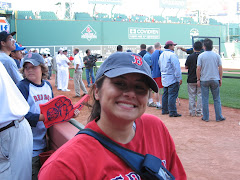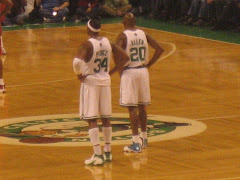As a huge fan of all seven Harry Potter books I have to say that I wasn't at all bothered by the recent coming out of the character of Albus Dumbledore. I read it and I wasn't sure at first if the paper was talking about the actor or the character, but as I read further it was the fictional character that was outed by the creator of the revolutionary series herself.
I have read all of the Harry Potter books several times, including this summer to freshen up for the seventh book, so all of the stories are pretty fresh in my mind. I keep trying to think of hints and clues that J.K. Rowling left behind, but none stood out. The only thing that I could think of is that in the part of the seventh book when reporter Rita Skeeter wrote a book called "The Life and Lies of Albus Dumbledore" when she mentioned that Dumbledore and another powerful wizard Gillert Grindelwald became close friends for a few months until they had a disagreement about what they would do to change the wizarding world and they never saw eachother again until Dumbledore defeated him years later. But even this part of the book wasn't an obvious clue, the only reason why I thought of it was because that is what the paper said.
J.K. Rowling didn't have Dumbledore prancing around with a pink wand trying to suduce Harry. He was a little busy trying to keep Voldemort, oh sorry, You Know Who, from killing all non-pure wizards and gaining domination over the wizarding world. He didn't make up all of these things about the prophecy and how Harry was the "Chosen One" just because he wanted to get a little alone time with him. He was trying to protect him from the dark lord.
It is crazy to think that priest would pull these books and movies from their libraries just because Dumbledore happens to be gay. Let me say again that he didn't say anything about his sexuality in the book, the only reason why we know he is is because of the author. Priests of all people shouldn't be judging others about their sexuality when there is major corruption going on in the church, but that is a different topic for a different day. What would Carlson think about this?
Wednesday, October 31, 2007
Monday, October 29, 2007
Talking Points #5
“Teaching to Change the World” by Jeannie Oakes and Martin Lipton
This article is about…
Myths
Metaphors
Rules
Power
Government
Education
Social class
Schools
American schools
Children
Parents
Perception
Profit
Competition
Testing
Future
High performing
Author’s Arguments:
Oakes and Lipton argue that our educational society bases our education system on myths and metaphors of what education should look like. Education is supposed to be for every child and that everyone can succeed, but the system guarantees that some students won’t.
“Americans can love all their children and want them to prosper while maintaining institutions and social structures that guarantee that some students won’t.” pg 18
“It had become clear that regardless of their merit, some people could never overcome the disadvantages with which they began.” pg 20
“Many well-off Americans saw ‘the problems’ as poor people themselves rather than the social and economic conditions that made them poor.” pg 21.
To be completely honest when I was reading this article I highlighted a few key points and sentences, but I don’t really think that I got the point of the article. I feel like it said a lot of stuff and I only pulled out that throughout the years we have become so competitive as a nation, whether economically or socially, that it has carried over into academics and is becoming increasingly harder for not only minorities to get into good schools of higher education, but people of the main ethnicity also. The academic standards are set so high that it is guaranteeing some students to fail and not succeed like they should in the public’s eyes.
This might be completely off the topic, but school is not for everyone, and this society has made it possible that now not even a college degree can guarantee you the dream job. Now it is required to get a masters degree and a doctrine, and whatever else they can come up with. When will all of the schooling be enough? There is only so much school a person can go through before it is time for them to go out into the real world and gain some experience. You could have all of the degrees in the world, but if you don’t have experience out there in the real world, then what good will it do. Society thinks that making it more challenging to get into school is better for us in the long run, when it is really hurting society because some either can’t afford it, or are not good enough based on these perfect standards.
I am pretty positive that I just went off on this big rant of basically how expensive school is and how if society would lower their standards a little they might see more success stories then failure. I think it will be interesting to see what my classmates have to say tomorrow, because I have no idea what this article was trying to say.
This article is about…
Myths
Metaphors
Rules
Power
Government
Education
Social class
Schools
American schools
Children
Parents
Perception
Profit
Competition
Testing
Future
High performing
Author’s Arguments:
Oakes and Lipton argue that our educational society bases our education system on myths and metaphors of what education should look like. Education is supposed to be for every child and that everyone can succeed, but the system guarantees that some students won’t.
“Americans can love all their children and want them to prosper while maintaining institutions and social structures that guarantee that some students won’t.” pg 18
“It had become clear that regardless of their merit, some people could never overcome the disadvantages with which they began.” pg 20
“Many well-off Americans saw ‘the problems’ as poor people themselves rather than the social and economic conditions that made them poor.” pg 21.
To be completely honest when I was reading this article I highlighted a few key points and sentences, but I don’t really think that I got the point of the article. I feel like it said a lot of stuff and I only pulled out that throughout the years we have become so competitive as a nation, whether economically or socially, that it has carried over into academics and is becoming increasingly harder for not only minorities to get into good schools of higher education, but people of the main ethnicity also. The academic standards are set so high that it is guaranteeing some students to fail and not succeed like they should in the public’s eyes.
This might be completely off the topic, but school is not for everyone, and this society has made it possible that now not even a college degree can guarantee you the dream job. Now it is required to get a masters degree and a doctrine, and whatever else they can come up with. When will all of the schooling be enough? There is only so much school a person can go through before it is time for them to go out into the real world and gain some experience. You could have all of the degrees in the world, but if you don’t have experience out there in the real world, then what good will it do. Society thinks that making it more challenging to get into school is better for us in the long run, when it is really hurting society because some either can’t afford it, or are not good enough based on these perfect standards.
I am pretty positive that I just went off on this big rant of basically how expensive school is and how if society would lower their standards a little they might see more success stories then failure. I think it will be interesting to see what my classmates have to say tomorrow, because I have no idea what this article was trying to say.
Monday, October 15, 2007
Talking Points #4
| “Unlearning the Myths that Bind Us” by Linda Christensen This article is about… Fairy tales Cartoons Inequality Myths Secret education Culture Media Domination Stereotypes Embedded Manipulation Dreams Imagination Standards Perfect Author’s Arguments: Christensen argues that society needs to become aware of the inequalities portrayed in children’s movies, literature and cartoons, and use these stereotypes to image what a better world it would be without this “secret education.” “The ‘secret education’…delivered by children’s books and movies, instruct young people to accept the world as it is portrayed in these social blueprints. And often that world depicts the domination of one sex, one race, one class, or one country over a weaker counterpart.” Page 126 In the Little Mermaid the students noticed that “‘Look, Ursula the sea witch is ugly and smart. Hey, she is kind of dark looking. The young, pretty ones only want to hook their man; the old pretty ones are mean because they are losing their looks.’” page 130 “They accept the inequalities in power and exploitative economic relationships. Their acceptance teaches me how deep the roots of these myths are planted…” page 132. I have to say that I completely agree with this article because everyone wants their life to be a fairy tale and live happily ever after, but even though we dream this, we know that it won’t end up just as we planned. But these movies and cartoons are an excellent escape for children to experience and to broaden their imagination, but where do we draw the line? I feel like you can’t just say to a child, this will never happen so don’t even think about it or get your hopes up, they do have to learn on their own, but another side of me wants to tell these kids that it is very unrealistic because life isn’t perfect and life isn’t fair all the time. These cartoons and movies can also make a child feel awful about themselves because they don’t look like the people in the movies. They do not have that hour glass shape, and they don’t have the blond hair and the blue eyes to match their perfect skin tone. It is still hard for me to accept the fact that I will never be skinny like the people I see in the movies or in the news because that is not who I am, it is hard sometimes, but it is reality. There is the notion that you can’t be smart and pretty at the same time; you have to be one or the other. That stereotype needs to be broken because it gives girls the idea that in order for people to like you that they have to loose a sense of themselves along the way, and that is no way to live. Also how all of the pretty girls are always thinking about boys and that once they have a husband they will have children and that will be their job, and for some people that is enough, but women don’t just have to be wives and mothers. And the older they get doesn’t mean that they get mean because their looks are going. The sad thing is that we have made it a fact and a part of our lives that this is the way it is suppose to be. Poor people are not suppose to be happy and they don’t deserve a leading role, or to be cared about, and if you are rich you can be guaranteed a leading role and for everyone to know that you are important. These stereotypes need to be broken because not all step mothers are evil, and not all fat people are ugly and mean. If these didn’t exist then everyone would feel better about themselves, I know that I would. |
Saturday, October 6, 2007
Talking Points #3
| “Gayness, Multicultural Education and Community” by Dennis Carlson This article is about… Gayness Education Community Equal opportunity Stereotypes Out casting Fear Difference Normalization Silence Invisibility The “norm” Hurtful words Teachers Students Author’s Arguments: Dennis Carlson argues that gay men and women have been kept in their place in both the community of education and in society and how difficult the world has made it to be gay. 1. Gayness in the school and its techniques of normalization: First, erase gayness from the curriculum. Second, the “closeting” of gay teachers and lastly, verbal and intimidation of gay teachers and students. Page 236 2. “One way of normalizing curriculum or text works is by presenting students with a ‘selective tradition’.” Page 236 3. “Abuses are tolerated because gay teachers and students operate in an environment where they feel afraid to stand up for themselves.” Page 239 When I read this article I couldn’t help but put myself into different situations if I were a teacher and these issues were brought up, I was thinking about what I would do. And as I read on I found out what not to do, and that is to completely ignore the topic if it comes up in the classroom. Now if I was going to teach high school, and this topic came up I wouldn’t have a problem with my class talking about it, and I would express my opinion. But what would I do in an elementary school classroom? How would I approach the students and tell them in a way that they understand? And I was thinking that I would try to avoid the situation because I wouldn’t want to cause any problems with the students parents because that is something no teacher needs. But I can’t just ignore it with elementary students because they will not rest until they hear an answer that is satisfactory. I think that my dilemma is a key example of what our society thinks about talking about being gay in the classroom. We don’t want to step on anyone’s toes so we ignore the situation, but it really isn’t helping the situation. Allan Johnson says that just because we don’t address a particular issue, doesn’t mean that it will just go away. So if someone were to ask me in my classroom “what does gay mean?” or anything about this subject I would have no choice but to address it, but I am struggling to think of the best way of approaching it. I believe that everyone is different, from the way we talk, and the way we look all the way to our sexuality, we are all different and that is what makes us who we are. No one should have to hide who they are because of public opinion, and that means in the education community. I don’t think that teachers should talk about their personal lives with their students, but they shouldn’t be punished or have less opportunity because of their sexuality. This topic can lead to controversial arguments and that is why people don’t like to talk about it. |
Subscribe to:
Posts (Atom)



